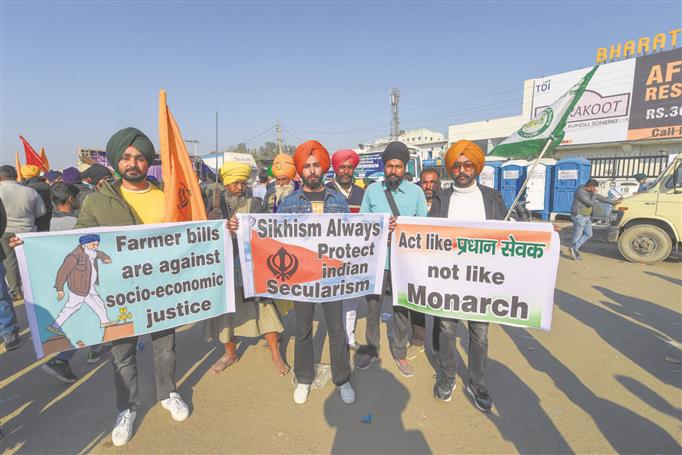
PROTEST PATH: The prolonged agitation is not only causing hardships to the farmers but also damaging Punjab’s economy. PTI
BB Mahajan
Former Union Food Secretary
A large number of farmers — mainly from Punjab, Haryana and western UP, supported by farmers from other states — have been camping in the bitter cold on Delhi’s borders in protest against the three agriculture-related Acts which may be called in brief the agriculture trade liberalisation Act, contract farming promotion Act and the Essential Commodities (Amendment) Act. After a series of discussions with the farmers, the Central Government has agreed to make certain amendments.
In the trade liberalisation Act, there is a provision that allowed private parties to set up mandis. It is provided that the state government will not be able to levy any fee, tax or cess on transactions in these mandis or regulate these in any way. This will obviously give an unfair advantage to the private mandis. Farmers apprehend that this will enable the private mandis to offer better terms. As a result, trade will gradually shift from the regulated mandis to the private mandis, leading to the withering away of the former. These mandis, particularly in Punjab and Haryana, have played a crucial role in ensuring a proper price to farmers for their produce through a system of open auction. Once these are weakened, private traders functioning in unregulated mandis will be able to exploit the farmers and purchase their produce at a throwaway price. Moreover, the state government will lose the income from market fee, rural development cess etc, which is used for the development of infrastructure in these mandis and the surrounding rural areas. To allay this genuine apprehension, the Centre agreed to permit the state governments to levy fee, taxes and cess in the private mandis on a par with government mandis and regulate the traders setting up and operating in these mandis. This will provide a level playing field to both sets of mandis and may benefit the farmers by providing healthy competition.
In the contract farming promotion Act, there is a provision that bars the jurisdiction of civil courts in the disputes between the farmers and other parties regarding any matter arising out of the contract. Farmers felt that the alternative mechanism provided in the Act, viz, conciliation board appointed by the SDM and appeal to the DCs will deprive them of justice as they may act under political pressure due to the clout of the powerful corporates. To allay this apprehension, the Government of India agreed to remove the provision barring the jurisdiction of civil courts.
Harvesting of wheat and paddy takes place in a small period of about a month. Market arrivals at that time are so heavy that under free market conditions, prices would slump to extremely low levels. Since farmers, particularly the small ones, do not have the holding capacity, they will have to sell these at rock-bottom prices while the traders will gain handsomely as they sell later when prices rise. Unlimited procurement of wheat and paddy at pre-announced Minimum Support Price (MSP) by the government has ensured that the famers are able to get fair price for their produce. Farmers apprehend that the intention behind encouraging the private traders to buy in private mandis is to give up or reduce the procurement by government, particularly since government stocks at present are well above the requirement for PDS and buffer stock. This will remove a major safety valve which has sustained the farmers, particularly in Punjab and Haryana, by enabling them to sell all their produce at MSP. To allay this apprehension, the Centre has offered to give a written commitment to continue procurement at MSP as at present.
The Centre’s view is that having agreed to make changes to allay the genuine apprehensions of the farmers, there is no justification for them to continue the agitation. Farmers are not satisfied with the concessions, there is also trust deficit and they apprehend that the concessions made may not be honoured. They demand repeal of the Acts. The government considers that these Acts are necessary to modernise agricultural marketing, promote private investment in post-harvest activities like storage and food processing and that these are in the interests of the country and the farmers. It is, therefore, unwilling to repeal the Acts.
The prolonged agitation is causing serious hardships to the agitating farmers and damaging the economy of Punjab where rail services continue to be affected. The stir may produce disaffection against the Central Government which may be exploited by separatists and may even create disaffection among the defence personnel hailing from the families of agitating farmers. It is, therefore, necessary to find a way to end the impasse without any delay.
One of the following two alternatives may satisfy the basic interests of both the parties and may, therefore, help to break the impasse: First, the government may offer to enact a Bill through an ordinance to be ratified in the Budget session, incorporating the modifications already agreed plus a provision permitting a state government, if it so desires, to notify that either or both of these Acts, or any specific provisions thereof, will be applicable in the state from a date to be notified later. This will enable a state like Punjab where farmers are apprehensive about the adverse effect of the Acts even after modifications to postpone their implementation.
Secondly, the government may offer to enact a law to repeal the two Acts and simultaneously enact another law after incorporating the modifications already agreed with additional provision suggested above.
In either case, a written commitment may be given by the Centre to continue the present practice of procurement at MSP of all the wheat and paddy that may be offered at that price.
The amendments to the Essential Commodities Act do not harm the farmers in any way and would, in fact, help them as these would encourage purchase by traders, food processing units, export houses etc, thus providing them an additional avenue for marketing of their produce. So long as the government remains committed to buying at MSP, there is no risk of these buyers beating down the price. It should be possible to convince the farmers about it once the apprehensions about the other two Acts are allayed.
Join Whatsapp Channel of The Tribune for latest updates.




























